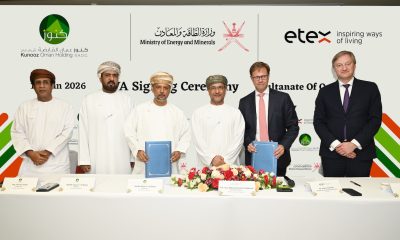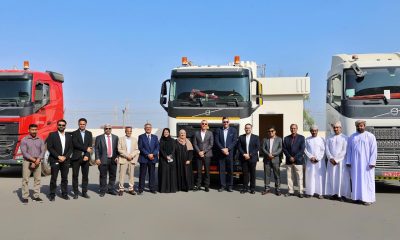Oman 2015
NEW NATIONAL ENERGY STRATEGY
PAEW has recently finalised studying the national energy strategy that defines the general guidelines and policies, which are necessary for securing the Sultanate’s energy needs.

HE Mohammed Bin Abdullah
Al Mahrouqi
Chairman, The Public Authority for Electricity and Water (PAEW)
PAEW has recently finalised studying the national energy strategy that defines the general guidelines and policies, which are necessary for securing the Sultanate’s energy needs.
Since 2011, PAEW has adopted a vision for ensuring high-quality sustainable and reliable potable water and power services accessible to all people in the Sultanate. The strategy is based on the following objectives:
- Enhancing services to customers
- Achieving high operational efficiency
- Building international standard
- Human resources development
Accordingly, key performance indicators have been developed to ensure the implementation of these strategies according to a specific schedule.
NATIONAL ENERGY STRATEGY
Since the inception of the electricity sector in the Sultanate, Oman relied almost 100 per cent on natural hydrocarbon resources (gas and diesel) to generate electricity, as the Sultanate is an oil and gas producer. Currently, oil and gas represent nearly 95 per cent of the total electricity production, as the gas is optimal alternative for diesel from environmental and economic perspectives. The Sultanate uses diesel to produce electricity at small capacities in rural areas. To ensure the optimal use of natural resources in the Sultanate, the government has understood the importance of giving shape to a national energy strategy illustrating the most suitable energy alternatives for the production of electricity in the Sultanate and identifying the country’s energy needs in the medium and long terms, before starting the execution of renewable energy projects in the Sultanate. In response to this, PAEW has recently finalised studying the national energy strategy that defines the general guidelines and policies, which are necessary for securing the Sultanate’s energy needs in the medium and long terms through using different sources of energy while giving special focus to studying the best mix of electricity generation sources. Therefore, this study will determine the ration of renewable energy in the national energy mix. This study was finalised in the first half of this year. In parallel to the national energy strategy study, the Sultanate currently seeks, considering the accelerated growth in electricity demand, to diversify power generation sources by introducing renewable energy sources (solar energy and wind energy) in the electricity generation process, in order to increase electricity security and redirect hydrocarbon resources to other sectors such as industry and export to achieve the best economic value. In this regard, Authority for Electricity Regulation (AER) supervised in 2009 a comprehensive study on the level of renewable energy in the Sultanate in cooperation with a world-renowned consultant. The study showed that the solar power and wind power energy density levels are among the highest in the world.The study recommended an early execution of pilot small-sized renewable energy projects in rural areas to ensure the performance and effectiveness of renewable energy techniques in local climatic conditions. The first project of such a kind was signed by the Rural Areas Electricity Company (RAECO) and the company that executes the projects, in late 2013. RAECO works with Authority for Electricity Regulation (AER) for executing other pilot projects recommended by the study. RAECO is working on building a wind farm with a capacity of 50 megawatts in Dhofar Governorate. PAEW has also conducted studies aimed at expanding renewable energy projects in the future, including the renewables readiness assessment project, installing solar cells on roofs of buildings, feasibility study on generating electricity from solar energy at a capacity of 100-200 megawatts, studying wind atlas, studying solar-powered water desalination, using hydraulic turbines to generate electricity.
INCREASING EFFICIENCY
Authority for Electricity Regulation (AER) – Oman ensures the economical operation of the sector, which includes reducing electricity waste. The contract includes creating new electricity generation capacities for market competition and economical purchasing. Bids submitted by the private sector to create new power generation capacities are assessed for economic, environmental and technical standards. This makes private sector investors compete in using up-to-date technologies to boost efficiency and effectiveness of the produced energy. With regard to grids, AER has developed an incentives mechanism to urge electricity distributors to reduce electricity waste. This mechanism is based on identifying a waste reduction target every year to reduce electricity waste in the electricity distribution grids. AER rewards the company that passes the annual target and fines those that do not. The relatively low waste level can be observed despite the significant expansion of electricity grids and the steady growth in the sector.
-

 News2 months ago
News2 months agoAI Security Conference 2025 Hosted by Securado Highlights the Changing Cybersecurity Landscape
-

 Insurance2 months ago
Insurance2 months agoSupporting Community Wellness: Liva Insurance Sponsors Muscat Marathon 2026 with Free Health Checkups
-

 Interviews1 month ago
Interviews1 month agoEXCLUSIVE INTERVIEW: TLS Rebranding Marks Strategic Leap Toward Innovation, Sustainability & Growth
-

 Insurance1 month ago
Insurance1 month agoLiva Insurance Supports Community Wellness Through “Experience Oman – Muscat Marathon 2026”
-

 Investment3 weeks ago
Investment3 weeks agoLalan Inaugurates Its First Overseas Manufacturing Facility, Marking Sri Lanka’s First Investment in SOHAR Freezone
-

 Banking & Finance1 month ago
Banking & Finance1 month agoA New Platform for SME Growth: Oman Arab Bank Unveils Tumouhi
-

 News3 weeks ago
News3 weeks agoKunooz Oman Holding Partners with Belgian company Etex for Local Gypsum-Based Business Development
-

 Construction4 weeks ago
Construction4 weeks agoInternational Heavy Equipment hosts Open Day at its Refurbished Facility in Sohar Industrial Area






























You must be logged in to post a comment Login